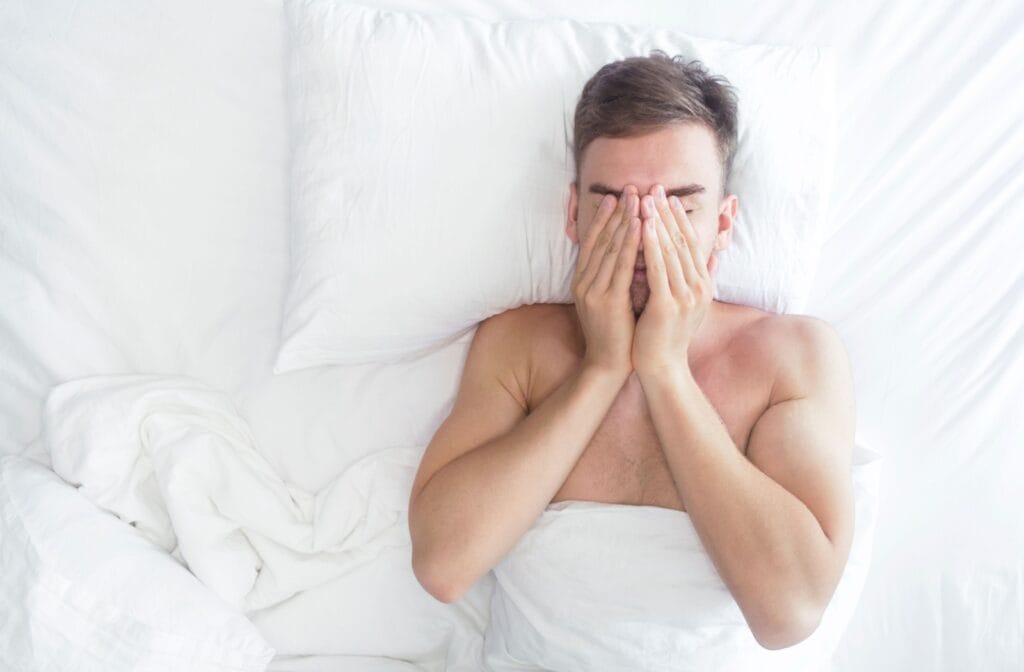Waking up with dry, gritty eyes can be an uncomfortable way to start the day. Whether it’s a mild irritation or an ongoing struggle, morning dry eyes can disrupt sleep quality and impact your mood and productivity.
Morning dry eye symptoms can be caused by several factors (or a combination of them), including environmental factors (like humidity levels, dry climate, and poor air quality), medications, allergies, contact lenses, or tear quality. The good news is that understanding the potential causes of dry eye symptoms can help you find the relief you need.
What Causes Dry Eyes in the Morning?
Morning dry eye symptoms can stem from several factors, from temporary issues to chronic conditions. Below are some of the most common culprits causing dryness and irritation upon waking up.
Contact Lenses
For contact lens wearers, even minor missteps—such as forgetting to remove your lenses before bed—can lead to dry eyes. Contact lenses can restrict oxygen flow to your cornea and absorb natural moisture, worsening dryness.
Allergies
Allergens such as dust mites, pet dander, or pollen can irritate your eyes while you sleep. This irritation may result in dryness, redness, and itchiness that lingers when you wake up. Allergy sufferers often experience heightened symptoms overnight, especially during spring and fall.
Dry Environment
If you live in an area with low humidity or sleep in a particularly arid room, your eyes might struggle to stay hydrated overnight. Adding a humidifier to your bedroom setup can help maintain a more moisture-rich environment.
Medications
Certain medications can reduce tear production and contribute to dryness. Common culprits include antihistamines, decongestants, antidepressants, and medicines for high blood pressure.
Tear Quality
Your tears aren’t just water. They’re a carefully balanced mixture of water, oil, and mucus. When these components are out of balance, your tears may evaporate too quickly or struggle to coat your eyes, leading to morning dryness. Poor tear quality is often linked to conditions like Meibomian Gland Dysfunction, where the glands that produce the oily layer of your tears become blocked.
Inadequate Tear Production
Sometimes, your eyes don’t produce enough tears, a condition known as aqueous tear deficiency. This could be due to aging, hormonal changes, or health conditions like Sjögren’s syndrome. Without sufficient natural lubrication, your eyes will likely feel dry upon waking.
Nocturnal Lagophthalmos
Nocturnal lagophthalmos occurs when the eyelids don’t fully close while you sleep. Even a tiny gap can expose the surface of your eyes to air, leading to increased tear evaporation and that familiar dry sensation in the morning. This condition is commonly associated with poor eyelid muscle tone, facial nerve paralysis, or scarring.
How Can I Stop Having Dry Eyes in the Morning?
The good news is you can try several strategies and remedies to alleviate dry eyes in the morning. Here are some options that can make a real difference.
What Home Remedies Help Dry Eyes?
- Stay hydrated: Drinking plenty of water throughout the day helps maintain adequate hydration levels for your body and eyes.
- Dietary improvements: Increasing your intake of omega-3 fatty acids (found in fish like salmon, walnuts, and flaxseeds) can improve tear quality.
- Warm compresses: Applying a warm compress to your eyelids can help unblock the oil glands, improving tear quality and overall eye hydration.
- Artificial tears: Over-the-counter lubricating eye drops or gels can immediately moisturize your eyes and provide relief throughout the day.
- Eyelid hygiene: Gently cleaning your eyelids and lashes with a scrub or cleanser can help remove dirt and debris that may block your oil glands and worsen dryness.
- Adjusting sleeping conditions: Avoid directing fans or vents toward your face while you sleep. Wear moisture goggles or a lightweight eye mask if you suspect nocturnal lagophthalmos.
- Humidifiers: Running a humidifier in your bedroom can maintain a moisture-rich environment, reducing tear evaporation while you sleep.
The Difference Between Morning Dry Eye Symptoms & Dry Eye Syndrome
It’s important to differentiate between occasional morning dry eyes and dry eye syndrome—a chronic condition that may require professional treatment.
How to Tell if Your Dry Eye Symptoms May Be a Sign of Something More
- Frequency: If you wake up with dry eyes every morning, it might indicate an underlying condition.
- Severity: Consistent burning, itching, or light sensitivity could indicate a more serious issue.
- Duration: Temporary symptoms from environmental factors usually improve, but persistent symptoms lasting all day might suggest dry eye syndrome.
- Additional symptoms: Crusty eyelids, extreme redness, or vision fluctuations often indicate the need for medical evaluation.
If you’re experiencing any of these signs, consider scheduling a visit to an eye care professional for further assessment.
How to Find Relief From Dry Eye Syndrome

Lifestyle changes alone may not be enough for people with chronic dry eye syndrome. Fortunately, advanced treatments are available to tackle the issue head-on. Here are some standard options your optometrist may suggest:
- Prescription eye drops: Medications can increase tear production and reduce inflammation.
- Punctal plugs: These tiny devices block tear drainage, helping your eyes retain more moisture.
- Light-based therapy: Intense pulsed light (IPL) therapy improves symptoms by targeting inflammation and clearing oil gland blockages.
Speaking with an optometrist is the best way to determine which solution suits your needs.
Start Your Day Fresher with Hydrated Eyes
Waking up with dry eyes shouldn’t be the norm—it’s a sign that your eyes need extra care and attention. Whether you’re addressing occasional symptoms with simple home remedies or seeking advanced treatments for dry eye syndrome, relief is within reach.
At ERC Optometry, we specialize in diagnosing and treating dry eye conditions while providing a soothing, stress-free experience. Contact us today to schedule an appointment and determine whether there is an underlying cause of your dry eyes.

